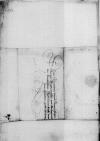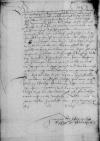Dieweil der ⌊tag⌋ unnsers zuesamnekom(m)ens uff s(ancti) Michaelis[1] ghen ⌊Graudentz⌋ vorhannden / und wir durch etliche der vornembst(en) hernn ⌊ko(nigliche)n rethe dieser lannde⌋ ersucht / unnd erinnert werden, / wie mit der ein genhomen czeise diss jhar gefallenn, / damit sie in gewisse stelle dem ⌊lande⌋ zu guth gelegt unnd gehanndelt wurde, / ist unnser bedenncken, / solchs auch E(wer) Erbarkeit written over H(erlichkei)t⌈H(erlichkei)t E(rbarkei)t Erbarkeit written over H(erlichkei)t⌉ anzuzeigen, / das die in ihrer statt amptern / dorann wolde sein, / rechennschaft der izct gefallenen zeise / unnd derer, die vor dieser ist eingenhomen, / zufurdern und uf nechst zukunftig(en) landts tag dieselbten rechenschaft denn hernn rethenn einczubrengen, / damit gewust wurde, wieviel der vorigen unnd itzigen gewest / und das dem nochgekomen macht werden, / welche von ⌊gemeinen stenden diss landts⌋ / dieser letztenn zeise halben ist wurdenn beschlossen. / Solchs hab wir E(wer) E(rbarkei)t, die wir gotlichen gnaden bevelhen, / aus anderer ⌊hernn⌋ angebenn / und das es gemeinem nucze ⌊diss lanndts⌋ notturti(?)fft ist, / freuntlicher weis nicht wolt(en) vorhalt(en).


 APG 300, 53, 268, p. 174
APG 300, 53, 268, p. 174